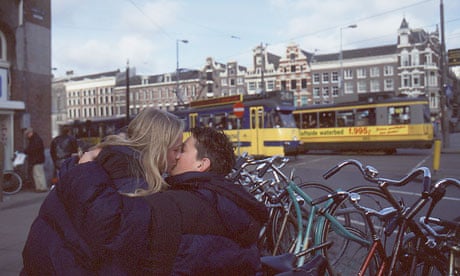My son is three years old; he is learning to use the potty and brush his teeth at the moment. Next year, however, when he starts primary school, he will get his first lessons in sex education, during the so-called Lentekriebels week – the Dutch word for "spring itching" or "spring butterflies". This is not a joke, nor am I bringing up my offspring in a hippy commune. We live in a quiet middle-class neighbourhood in Amsterdam. Lentekriebels is a government-subsidised project for children aged four to 12. This year's Lentekriebels has just finished, with an exhibition about relationships and sexuality in hundreds of schools all over the Netherlands.
My son won't bring home the leaflet "Sex Yes, Worries No", about the use of contraceptives, until he is at least 10. He wouldn't be able to read it at the moment anyway. But his teachers will be talking about cuddling, friendship, newborn lambs in the fields and the differences between boys and girls. And his class might be visited by pregnant women and nursing mothers with their babies.
The Netherlands has a lurid reputation abroad when it comes to sex. Everyone knows about the red light district in Amsterdam and legalised prostitution. So it might come as a surprise to some to hear that deep down, the Dutch are very conservative people who take sex seriously. Very seriously, in fact.
Sex education has traditionally been an important part of the school curriculum here. Lentekriebels is in line with the Dutch tradition of assigning to schoolteachers responsibilities that might elsewhere be handled within the family. As my teacher in primary school in the 1970s told me: "If your parents don't bring you up properly, our school has to do the job for them." The issue then was not sex but prayer (we didn't pray at home), but the principle is the same. Parents are not to be trusted to do a good job and sex is a danger zone, like drugs or smoking. To discuss it at school from an early age will make young people aware of the many risks when they start to experiment with relationships and sexuality.
Dutch sex education doesn't stop at Lentekriebels. I remember vividly the little grey-haired lady with the large handbag who came to my high school to talk about "the first time", true love, the effects of alcohol and how to use a condom. I was 14 and we all found it great fun. And the lessons went on until my final exams: prostitution, reproduction, sexually transmitted diseases – we were spared nothing.
There is much to be said for the Dutch approach. Official figures show that the pregnancy rate here among teenage girls, 5.3 per thousand, is one of the lowest in Europe. The explanation is believed to be the open approach towards sexuality. And we see similarly low numbers when it comes to abortions and STDs.
The UK, by comparison, has a teen pregnancy rate that is nearly 400% higher and a much higher abortion rate.
In an attempt to make sense of these figures, we can turn to Nick Hornby's novel Slam, in which 16-year-old Sam gets his girlfriend, Alicia, pregnant. On the internet he finds government statistics about teenage parents:
And some of them were funny – like, one in 10 teenagers couldn't remember if they'd had sex the night before or not, which is pretty incredible if you think about it. I think this meant that one in 10 teenagers had got so blasted the night before that they didn't know what had gone on. I don't think it meant they were just forgetful, like when you can't remember whether you packed your games kit.
Dutch teenagers are probably just as sexually active as British ones and may even drink as much. But thanks to the priority given to sex education, Sam's Dutch equivalent can go skateboarding without worrying whether he has knocked up his girlfriend.
This article was commissioned after being suggested by 13thDukeofWybourne. If you have a subject you would like to see covered by Comment is free, please visit our You tell us page
